Stanley, Tony, and Don
David Chase and Matthew Weiner Deconstruct Toxic Masculinity in “The Sopranos” and “Mad Men”
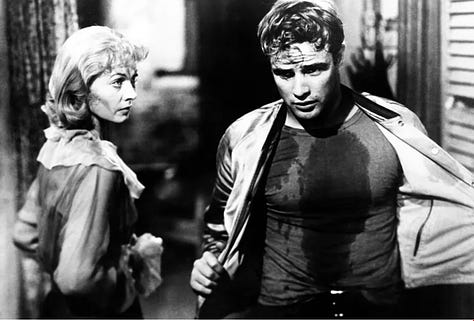
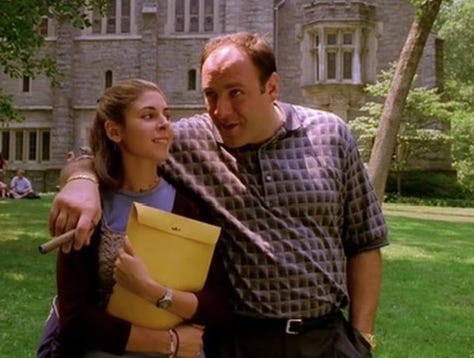
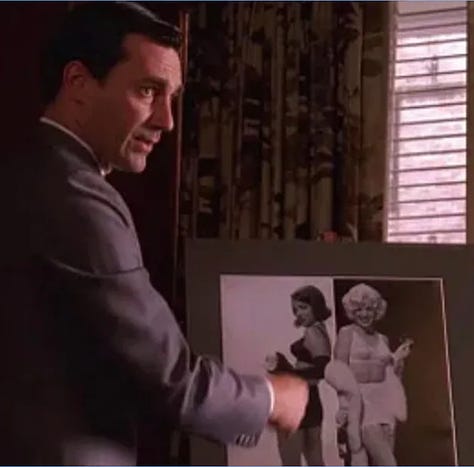
The Raw and the Cooked
A couple of years ago, our basement got flooded, and we were forced to move everything salvageable up to the sunroom, and then to sort out the items that were too mildewed from those to save. Among one of the boxes of my oldest books—I’m talking Cherry Ames, Junior Nurse here—I found some pages from a diary that I kept during 1962. I was fifteen. And among the pages about how passionately in love I was with a boy named Joel, along with scornful comments about girlfriends who had decided to save themselves until marriage (I was a virgin myself but cultivating a cool girl persona), I found references to television shows I was looking forward to watching. I apparently really loved Car 54, Where Are You?—a comedy about two New York City cops that I now remember was extremely popular that year (it won an Emmy for prime-time comedy), but the most informative trip down my memory lane was an entry about men. Be forewarned and forgiving: my gender ontology here is NOT politically correct:
“February 22, 1962:
All in all, I’m not happy but am in a sort of unthinking existentialistic [sic] state and am pretty content. Especially since tonight is “Dr. Kildare” which really is pretty damn lousy and I think he looks like a girl, but I get some kind of sadistic pleasure out of seeing things being operated on. Give me “Ben Casey” anytime! He’s really a bitch, but he’s real rough and resembles a man at least! My taste in men (in the entertainment field) is really weird. I go from Marlon to Yves Montand to George Chakiris to Warren Beatty in two minutes. I hate Victor Mature, Bert Parks, Rory Calhoun, The Everly Brothers, Pat Boone, Eddie Fisher, etc.
The “etc.” contains the essence of what I was repelled by: referencing Claude Levi-Strauss, call it the cooked rather than the raw. (Marlon Brando: raw, especially in Streetcar Named Desire; Pat Boone: very, very cooked; Lassie: cooked; Rin-Tin-Tin: raw; Beatle John: raw; Beatle Paul: cooked.) My description of Joel (my real-life crush) bears out my preference for the raw: “He’s fast and moody, and he mumbles instead of talking and everyone thinks he’s ugly, but I think he is adorable.” I liked bad boys, boys whose gristle hadn’t yet been marinated by gentlemanly ideals. I liked boys who broke the rules.
It’s also true, unfortunately, that the raw boys were also the ones who treated me badly, and I know I’m not alone in that. There are many possible explanations, from lack of self-esteem to the belief, fostered by many movies, that if boys were mean to you it was because deep inside they really were attracted to you, to a confusion between the mean and the masculine. And then there’s that enduring (and often toxic) fantasy that you would be the one to break through, to civilize the beast (without, of course, cooking out his or her sexual appeal). Because of course, there was vulnerability underneath the macho bravado, and you would release it—like Stella of Streetcar, who brought out the little boy in Stanley (Marlon Brando). I wrote about it in The Male Body, describing the famous scene in which Stella (Kim Hunter), sultry and erotically mesmerized, descends the stairs to their apartment:
At the bottom of the stairs is her husband Stanley, crying for her like a baby that’s lost its mother, his muscular yet graceful back exposed, his T-shirt in shreds. A few moments before, he had beaten Stella in a rage . . . Now, realizing what he’s done, he’s distraught, beside himself with remorse. As Stella reaches the bottom of the stairs, he drops to his knees before her, and buries his head in her body. ‘Don’t ever leave me, baby,’ he pleads; her hands run down the length of his back, then grasp his head, his hair, as she kisses him passionately.
Later, when Stella is in the hospital having her baby, Stanley rapes her sister Blanche, and the Breen Office insisted he be punished by having Stella, at the end, leave him—a change in the original that Williams reluctantly agreed to. In real life, however, it doesn’t always happen that way. That’s what The Sopranos exposed, and it’s the source of its brilliance. No, Tony Soprano (James Gandolfini) doesn’t rape anyone. He just murders people—and sometimes with his own hands, not by sending a Luca Brazzi out to do it for him—and he seems even to enjoy it. And although his wife leaves him for a time, at the end the family is together, eating at Holsten’s. If he is to be narratively punished, it’s not going to be Carmella who does it and for all we know—the last scene is ambiguous (Is he about to be whacked or not? The jury is out, and David Chase isn’t telling)—he’s going to get away with it all.
Tony Soprano and “College”
The fact that Tony Soprano, in 1999, inaugurated a new version of masculinity—one that boldly refuses to soften and make more palatable the violence that often goes along with the sexual (or any other) appeal of the raw—isn’t apparent until the fifth episode of the first season, called “College.” The writer David Chase (episode co-written by Jim Manos) knew it would be transgressive. The Godfather had Don Leone kill with his own hands only once, when he was a young immigrant (played by Robert DeNiro) trying to establish himself in a neighborhood run by a greedy, less attractive Don. And once he is The Godfather (Marlon Brando) the film makes clear his biological family is his priority and justification for everything he does. When his son Michael loses touch with that, even going so far as to have his own brother killed, Coppola no longer bestows the affection that the first film brought to its depiction of Vito.
Tony Soprano, unlike Vito, likes the life, doesn’t dream of legitimacy, and complains to his therapist Dr. Melfi (Loraine Bracco) that “the sun is setting over the empire,” and that he’s come in at the end rather than beginning. Until “College,” we never see any real tenderness toward his children, and although he is troubled by panic attacks and mourns the leaving of a family of ducks from his pool, Tony is thoroughly coded as hyper macho, from the opening credit journey from the Lincoln Tunnel to his north Jersey McMansion (“the rings on Tony’s meaty fingers, the thick dark hair on his forearms, the cigar between his teeth, the smoke trailing from his mouth as he checks the rearview mirror”) to his casual but undeniable dominance over the other guys in his gang and his soldier, nephew Christopher (Michael Imperioli).
“College,” however, whose frame is a trip with daughter Meadow (Jamie-Lynn Sigler) to check out colleges in Maine, reveals the side of Tony that is at the heart of the fantasy I described earlier, of the vulnerable sweetness that the right woman can release in the beast. In this case—and I suspect it is this way for many men—that woman is his daughter. Throughout the episode, Tony affectionately hugs, playfully pokes, grabs her hand, and communicates his pride of Meadow—smart enough to be admitted to the best colleges, but as beautiful as “those models on the cover of Italian Vogue”—as he tells her at a candlelit dinner at a New England restaurant. They are both dressed up, and the atmosphere and intimacy are more like a grown-up date than a meal between father and daughter. Twice during the episode they exchange heartfelt “I love you”s—not in itself unusual between parent and child—but both also remark on how special and unusual their relationship is.
In fact, the relationship is unusual for Tony; he treats Meadow with an admiring respect that he doesn’t lavish on any other women in his life (not even Dr. Melfi), so much so that when she asks if he is in the Mafia, he admits to her (as he hasn’t to either Carmela or Dr. Melfi) that his work involves some “illegal gambling . . . and whatnot.” They both know the admission is a delicate way of acknowledging that what she has suspected is true—an honesty that she rewards by contrasting him with the other boring, “full of shit” lawyer and executive dads of her friends, and praising that “you finally told the truth about this.” (In the shooting script, she also says “And anyway, you’re my sexy dad”—a line eliminated in the actual filming, no doubt because, given all the intimacy between them, it was too suggestive.)
His behavior toward Meadow makes believable Carmela’s (Edie Falco) confession to Father Phil Intintola that she still loves Tony and harbors the hope that he can change. We’d seen Tony the slob, in his underwear, eating prosciutto straight from the package at the family kitchen island. We’d seen him as the confident, surly boss of his men. We’d seen him brushing off his mistress. What we haven’t seen is the sweetness that James Gandolfini brought to the role (“He’s such a big guy, and yet he’s such a sweetie pie,” said Chase of his casting)—and that is undoubtedly part of what attracted Carmela to Tony when they first dated, and perhaps part of what keeps her with him, too. We see in “College” why women fall in love with him—not just for his raw masculinity, but for his courtliness. Win his respect (as Meadow has) and the beast becomes a prince.
But hold on. The Sopranos is not going to indulge the viewer in any fantasies of that kind. On the way to one of Meadow’s college interviews, at a gas station stop, Tony had spotted Febby Petrulio, who ten years earlier had been busted for selling heroin and flipped on Tony’s father’s friend Jimmy. Tony holds him responsible for his father’s decline, and while Meadow is interviewing at Colby, chases Petrulio down and kills him—declining Christopher’s offer to do it for him, and with a predatory violence that (as Matt Seitz and Alan Sepinwall put it) “makes it clear that this isn’t some cute series about a henpecked Mob boss with troublemaking kids.”
Seitz and Sepinwall go on:
[B]ack in 1999, the effect of this particular killing was seismic. Four episodes in, viewers had seen murder and violent death attributable to negligence or incompetence, but Tony didn’t commit any of these acts, nor was he directly responsible for their occurrence . . . And although it seemed unthinkable that hat he’d go through the series without ordering at least one person’s death—he’s toyed with the idea—a killing like this seemed equally unthinkable, because TV protagonists didn’t get down in the muck like that. That was what henchman and guest stars were for.
Since the Sopranos, we’ve “watched countless protagonists do horrible things,” but this was the first. And while on a trip with his daughter! (Chase initially imagined The Sopranos primarily about the family, which would have appeal to female viewers.)As viewers, if afterward we still felt drawn to Tony, then, like Carmela, we would be accepting a bargain with the devil: the steep price of the magnetism (and promise of protection) of raw masculinity. Sure, he could be tender with his daughter, and genuinely adore her. But make no mistake: Tony was a killer.
Screenwriter Matthew Weiner, watching the episode, recognized how convention-shattering “College” was: “I just turned to my wife,” he recalls, “and said ‘You do understand what’s going on here. This has never been done, that you would take this hero and father of this TV show . . . and he’s going to strangle this guy with his bare hands. And we’re going to have to watch him next week and act like we care about what’s going on with him. That is revolutionary.” Revolutionary, yes—and also truer to life than the fantasy of reforming the beast, or the illusion that when the wife-batterer comes begging “Stella!” everything is gonna be alright from then on.
(Fans of “The Sopranos” will want to see the new documentary, “Wise Guys,” premiering Sept 7 on MAX):
Don Draper and “Maidenform”
Weiner, in part inspired by The Sopranos, went on to create and write Mad Men, a show that deconstructs masculinity in a different but no less revolutionary way. Don Draper (Jon Hamm) isn’t exactly raw, but he isn’t exactly cooked either. Unlike Stanley or Tony, he’d never be caught dead eating deli meat with his bare hands. But like Stanley and Tony, there’s a child-boy with not-so-nice instincts lurking under his polish, and Weiner is clear on where he stands when it comes to those instincts, particularly as they affect the lives of the women he has relationships with; in fact, the show offers some of the most explicit pro-feminist narratives I’ve seen on television.
Among those is “Maidenform,” an episode of Mad Men that begins from within the experience of women but concludes with an unexpected glimpse into the consciousness of a man, as he is challenged, perhaps for the first time in his life, to consider the effect of male dominance—which he has exercised throughout the episode—on women. It’s one of the best, least tied-up-in-ribbons endings of any episode I’ve seen (right up there alongside the ambiguity of the final episode of The Sopranos) and made me want to write a fangirlish note to Matt Weiner. (I chickened out.)
On the surface, the episode is about the sexual objectification of women. It opens with short scenes of each one of the central women characters putting on the constricting bras and girdles of the era, making themselves presentable for the work day. But although Peggy is the only one of the creative team who actually wears a bra, she is excluded from a new campaign for Playtex. She’s been assigned to the campaign, but her objections to the male-fantasy-inspired idea (lingerie that makes women into a Jackie Kennedy wife by day and Marilyn Monroe mistress by night) are ignored, she isn’t informed about meetings, and the door is shut in her face at the audition for models. After the idea is sold, she isn’t invited to the guys’ celebration (at the Tom-Tom club, a stripper bar). Frustrated, she asks Joan how to get the men to take her seriously, and Joan advises that she “stop dressing like a little girl.” So, she glams herself up and crashes the guys’ celebration, where she giggles and submits cheerfully when one of the Playtex reps pulls her onto his lap. If playing femme is what’s required to become a part of the team, she’ll do it.
In another one of the episodes’ story lines, Don and Betty attend a country club fashion show and auction, which features women in bathing suits (true to the era, no muscles and plenty of soft flesh). Leaving Betty at the show, Don sneaks off to see his mistress Bobbie Barrett, whose aggressively erotic talk annoys him, and he lets her know it. Then when she reveals that he has a reputation among the women of her set for being sexually proficient, he becomes furious and ties her to the bed; “I told you to stop talking” he says and storms off. Clearly, although he enjoys depersonalizing Bobbie while they are having sex (he tells her to stop talking several times), he doesn’t like being treated like a sex toy himself. He may want a “Marilyn” for a mistress, but he wants a silent one. As for his wife, he married her because she was a “Jackie” and when, the next morning, he finds her serving cereal in a bikini that she bought at the auction, he doesn’t like it and tells her so, leaving her puzzled and shamed. The duality of the new ad lives in Don’s psyche.
The episode is one of the many Mad Men episodes, written by a man, that is strikingly attuned to the price women pay for male fantasies and ambivalences about women. (It might have been called “What do Men Want?”) But instead of leaving Don unconscious about his need for control and the injustice of his expectations, the double binds it places his women in, Weiner gives Don a jolt of recognition. Don is shaving and his daughter Sally (Kiernan Shipka) is gazing up at him adoringly. “I’m not going to talk at all, Daddy” she says, because she doesn’t want him to cut himself. Hearing this, Don’s mood abruptly changes: he stops shaving, tells Sally to leave, and, shaken, sits down on the toilet. In one chilling moment, he’s seen the budding, in his own daughter, of the subservience, the docility, that women learn men expect of them. The thought is what feminists used to call a click moment. Does he want his own daughter growing up silent and obedient to a man? As Don, sitting on the toilet, stares into space, the camera pulls back to reveal both Don and his troubled reflection in the mirror in the hall.
For more on “Mad Men”:
Weekend Nostalgia: “Mad Men” Deconstructs 50’s Fantasies
Fifties TV was full of fairy-tales and fantasies meant solely to entertain and soothe—and encourage viewers to buy commodities to furnish idealized suburban lives. June Cleaver boosted both the industries in female glamour and Westinghouse appliances by cooking her pies in pearls and heels. No one got cancer, Lassie always came home, and Father always k…
This piece first appeared in TV, an edition in the “Object Lessons” Series.
:

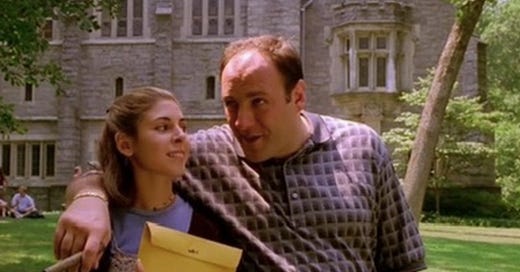


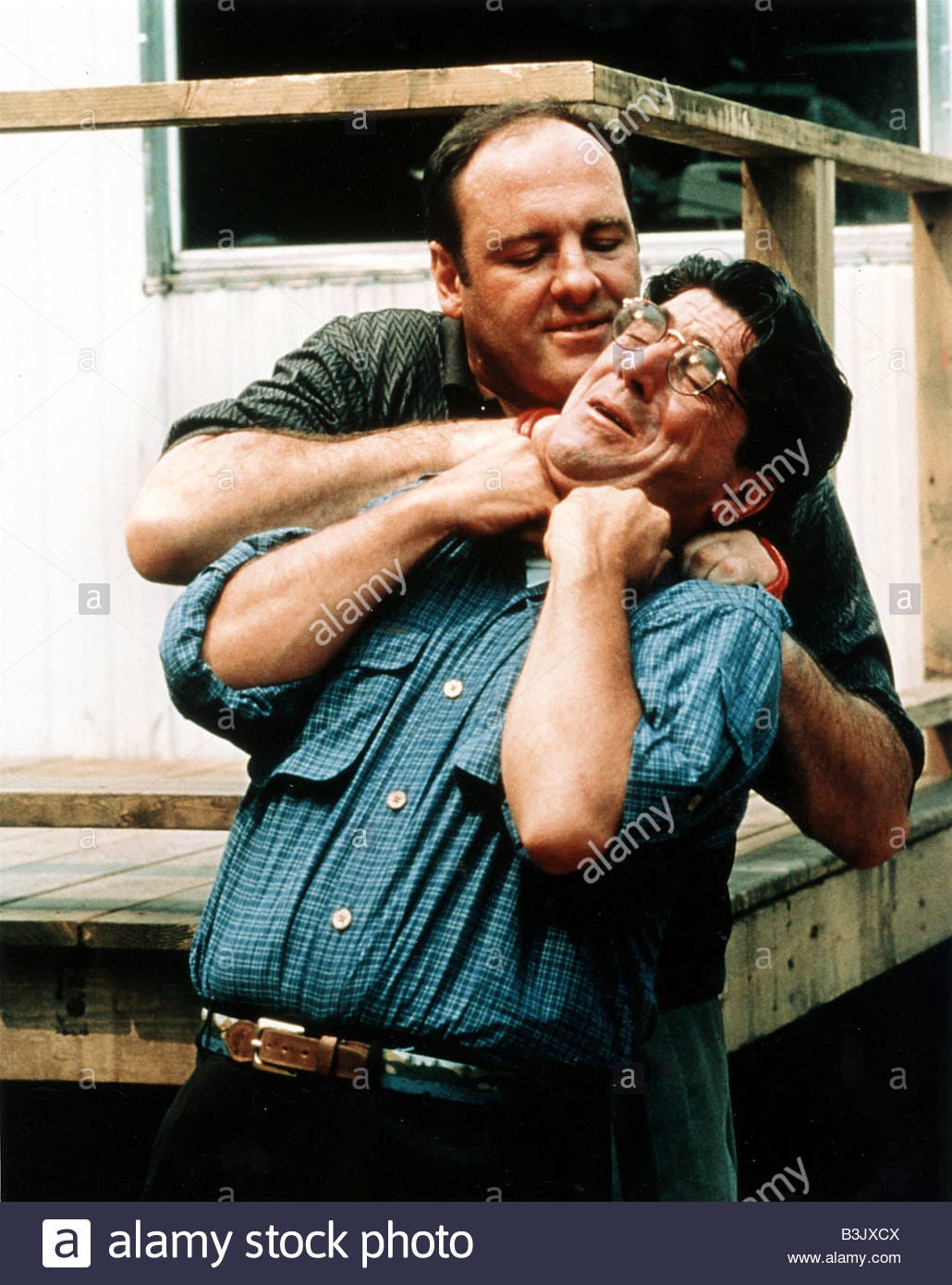
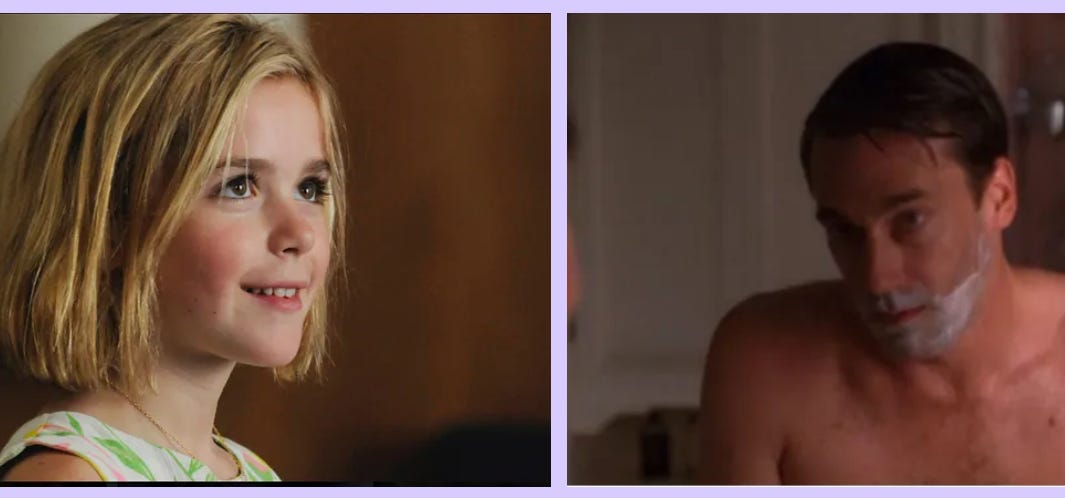
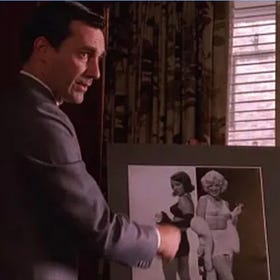

Always enjoy when you write about the bad boys. Probably because I suffered from the same adolescent fascination. Did I want to BE them? Did I want to be chosen by them? Since I've recently been involved in songwriting, I've been working for quite a while on a song called "My Last Bad Boy" - My current demo has a male singer, so a bit of a gender-bender. But I'm determined to get the right woman to sing "....loving you on top/tends to leave me on the bottom......" ETC!!!!!!! Great writing by you, as always.
Susan! Not the books! I keep mine on the third floor. I'd put them higher if I could : )